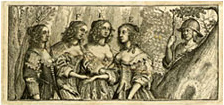Plutarch, The Quiet of Mind (1528)
Full Text
Not available
EEBO/TCP
Not available
Date
15280
Author
Translator
Book title
Tho. wyatis translatyon of Plutarckes boke, of the quyete of mynde
Publication place
London
Printer
Richard Pynson
Transcription source
EEBO/TCP
Text type
printed book
Genre
Treatises
Subject area
philosophy
Language
headwords: English
explanations: English
explanations: English
explanations: English
explanations: English
Word-group
type: other
Word-entry
type: other
sample: And after I had made a profe of nyne or ten Dialogues / the labour began to seme tedious / by superfluous often rehersyng of one thyng. which tho perauenture in the latyn shalbe laudable / by plentuous diuersite of the spekyng of it (for I wyll nat that my iugement shall disalowe in any thyng so aproued an auctour) yet for lacke of suche diuersyte in our tong / it shulde want a great dele of the grace. Altho / as me semeth / and as sayth this Plutarch / the plentuousnesse and faire diuersyte of langage / shulde nat so moch be desyred in suche thynges / as the frutes of the aduertysmentes of thē / whiche in my opinyon / this sayde Plutarch hath handsomly gadred togyder / without tedyousnesse of length / contayning the hole effect / of that your hyghnes desyred of Petrarch in his lytell boke / which he wrate to one of his frendes / of the Quiete of mynde / nerawhyt erryng from the purpose of the sayd Petrarch. which I haue made now of late ī to our tong nat precisely (I confesse) wtout errour as one shulde haue done that had ben of perfite lernyng / but after my rudenesse / seking rather the profite of the sentence than the nature of the wordes. but howsoeuer it be / if it may please your hyghnesse to accept it / it shall nat onely be a defence for the symplenesse of the boke / agaynst ouer busy serchers of other mennes actis / whan the good wyll shall haue the alowance of so vertuous a iugement / but also corage to the symple endeuour of this hande / towarde better enterprises. (a2)
sample: And after I had made a profe of nyne or ten Dialogues / the labour began to seme tedious / by superfluous often rehersyng of one thyng. which tho perauenture in the latyn shalbe laudable / by plentuous diuersite of the spekyng of it (for I wyll nat that my iugement shall disalowe in any thyng so aproued an auctour) yet for lacke of suche diuersyte in our tong / it shulde want a great dele of the grace. Altho / as me semeth / and as sayth this Plutarch / the plentuousnesse and faire diuersyte of langage / shulde nat so moch be desyred in suche thynges / as the frutes of the aduertysmentes of thē / whiche in my opinyon / this sayde Plutarch hath handsomly gadred togyder / without tedyousnesse of length / contayning the hole effect / of that your hyghnes desyred of Petrarch in his lytell boke / which he wrate to one of his frendes / of the Quiete of mynde / nerawhyt erryng from the purpose of the sayd Petrarch. which I haue made now of late ī to our tong nat precisely (I confesse) wtout errour as one shulde haue done that had ben of perfite lernyng / but after my rudenesse / seking rather the profite of the sentence than the nature of the wordes. but howsoeuer it be / if it may please your hyghnesse to accept it / it shall nat onely be a defence for the symplenesse of the boke / agaynst ouer busy serchers of other mennes actis / whan the good wyll shall haue the alowance of so vertuous a iugement / but also corage to the symple endeuour of this hande / towarde better enterprises. (a2)
STC
20058.5




